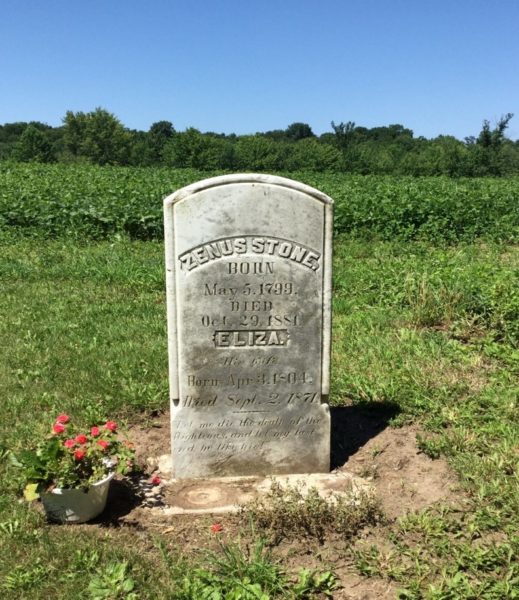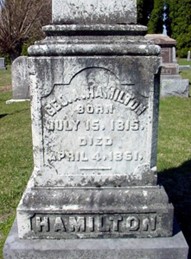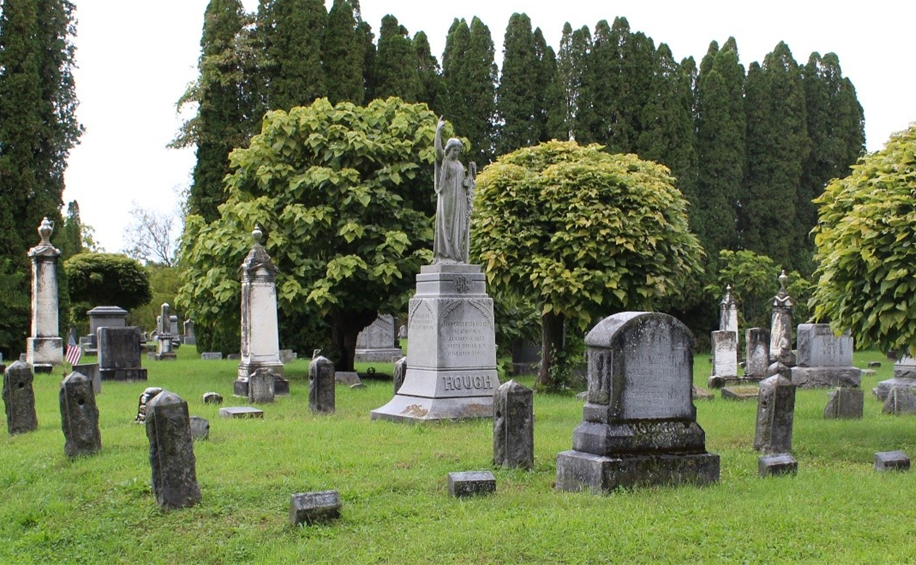Some of my maternal ancestors were early settlers in South Butler, New York.
My great, great, great grandparents, Zenus and Eliza Stone, came to South Butler at some point before 1830 and raised a passel of children there.
Zenus is listed on census rolls in those decades as being a shoemaker and a farmer. On April 22, 1837, Eliza gave birth to a daughter, Maretta. Almost exactly eighteen years later, on April 13, 1855, Maretta gave birth to Willis Merriman Stone, my great, great grandfather. No father for Willis was ever recorded.
In the subsequent census rolls, Willis is listed as a farm laborer on the farm of Zenus and Eliza Stone until the 1870s when Willis strikes out on his own.
I had long known that Willis had no father of record and that Maretta was a teenaged single mother in South Butler, New York, in the years leading up to the Civil War.
What I had not known until much later was that South Butler was an electrically charged particle of socially progressive thinking and action in that era.
Once I learned that Samuel Ringgold Ward and Antoinette Brown Blackwell and Gerrit Smith and so many other activists for social change of the era made a point of stopping in South Butler during just the years that my ancestors were leading their complicated private lives, well, I got to wondering.
My grandfather, Lawrence Willis Stone, was born in 1894 and died in 1986. He could not have known either Zenus or Eliza. He did, however, know Maretta. I regret deeply that I learned about the South Butler history only after he died so I never had the chance to ask him about Maretta.
But you can see why this nags at me: Maretta Stone becomes pregnant in a small, painfully small, village in the rural hinterlands of upstate New York within a year of a radical feminist woman preaching in that same village.
In the more recent years, I’ve learned who the missing father is likely to have been.
Thanks to one of the DNA family search processes, a cousin learned that he shared a significant genetic strand with a family whose farm is and has been for over a century just north of South Butler. Once I learned that family’s name, I went scouring through the census records and found that a son had been born to that family in 1837 and that his name was Willis Merriman. Willis Merriman left South Butler sometime between the 1850 census and 1860. By the 1860 census he is firmly rooted in central Michigan.
One mystery, after more than a century, solved.
But the greater mystery, for me, is this. What were they thinking? Especially Maretta and Willis there in South Butler as they blossom into adulthood with all the sexual energies roiling and within earshot of progressive orators extoling a different way of living. What were they thinking?

Less than a decade after Antoinette Brown’s time in South Butler on the cusp of the Civil War, a volume of verse appeared that had its origins in that tiny village, “Sunshine Through the Clouds: or, The Invalid’s Offering.” The author was George A. Hamilton. He had been born in 1815, outside Albany, New York. At some point in the following years, he and his family moved to South Butler.
In a preface to the volume, he claims to have been mostly confined to a room, a front parlor it seems, that afforded a window through which he could watch the world: “the earth, sky and air—the wood-lands and flowers, in view of the invalid’s window, painted before the mind that beautiful, soul-stirring, and oft changing scenery that seemed to awaken and animate the power of Song.”
The verses that follow never rise to the power of poetry. Mostly they consist of traditionally pious Christian exhortations and vapid nature verse clearly under the influence of 18th century British poetry.
But Hamilton’s collection is fascinating in those moments when Hamilton engages with the social controversies that absorbed so much of the energy of antebellum America. Like Ward and Brown, Hamilton was devoted to the socially progressive causes to which, it seems, many of his neighbors were also devoted.
Indeed, Hamilton’s poems on social and political issues provide a kind of picture of the mental world, a kind of histoire des mentalites of the South Butler radicals in the decades before the Civil War.
For instance, in one, “Christians to the Cleveland Prisoners” Hamilton distils the essence of the abolitionist views.
In 1858, a “slave-catcher” found John Price, who had escaped slavery two years prior. Price was living in Oberlin, Ohio. The slave-catcher lured Price out of the town, captured him, and took him to Wellington, Ohio.
A group of 37 Ohioans rescued Price and sent him on his way to Canada. The 37 were indicted for violating the Fugitive Slave Act of 1850 and made to stand trial in Cleveland. Abolitionists from around the country rallied to their defense.
What is noteworthy about Hamilton’s poem is how he characterized Price: there is no mention of Price’s race. Rather, he is described as “a brother man with hand / of tyrants on his manhood laid.” When he does acknowledge race, it comes in the form of asserting a common humanity beyond skin color: “this the shame of the Caucassian [sic] race, / he binds his brother of a darker face.”
That last couplet comes from a very long poem, “Our Country: or, The Path of Empire, A National Poem in Two Parts—History and Destiny.” Its 36 pages of nearly 1,000 lines tells the story of the founding and development of the United States in rhyming couplets of iambic pentameter. The poem is often as plodding as a metronome.
The form he chose indicates that he intended his poem to serve as a national epic. That form of heroic couplets in the manner of Dryden or Pope (though without their skill), is interesting. Dryden and Pope used the form for their translations of the great ancient epics, Vergil in the case of Dryden and Homer in the case of Pope.
Instead of creating a form for an American epic along the lines of his contemporary, Walt Whitman, Hamilton opts for 18th century classicist English poetry, particularly a sort of sub-genre of the epic called the Prospect Poem.
The Prospect Poem had its origin in John Denham’s “On Cooper’s Hill,” the first version of which was written in 1642. The poem uses the location of Denham’s family estate, south of London, as its point of departure for a critical review of political and social controversies of the time.
The Prospect Poem was a widely used form in English poetry in the 17th and 18th centuries. Hamilton’s poem shares many of the characteristics of its English precursors , adjusted, of course, for its being located in the United States.
Even more than Denham, though, Hamilton’s poem owes much to Alexander Pope’s “On Windsor Hill” (1704-1713) and Oliver Goldsmith’s “The Traveller, Or, A Prospect on Society” (1755-1764). Pope’s poem devotes its first 350 lines or so to a historical survey of English culture, using Windsor Forest as its locating principle, and concludes with 80 lines or so of prophecy.
Goldsmith’s poem is different in that instead of using a specific location as the organizing principle, his surveys European culture on a sort of tour, using the geography of each area as a beginning point before reviewing the virtues and, much more numerous the vices of each. He begins in Italy, proceeds north through France and the Low Countries and culminates in England.
Goldsmith concludes with a review of the ruinous effects the Enclosure Acts and aristocratic land-grabbing had on rural England. Small tenant farmers found it increasingly difficult to sustain themselves and were forced off the land into cities or to emigrate to the North American colonies including many of my ancestors who found themselves by the 19th century in upstate New York.
The final dozen or so lines of Goldsmith’s poem bring the prospect to the very land where my ancestors and George Hamilton’s families settled:
Forced from their homes, a melancholy train,
To traverse climes beyond the western main;
Where wild Oswego spreads her swamps around,
And Niagara stuns with thundering sound?
Oswego in the east, Niagara in the west: the bounds of the land that became central Upstate New York.
I first became aware of Hamilton in the later 1980s. At that time, I could locate only three copies of his book, one each in the rare books libraries of Syracuse University, Cornell and the New York Public Library.
I spent an inordinate amount of time in the Kroch Rare Books room at Cornell with my #2 pencil patiently transcribing and making notes on Hamilton’s verses.
Now, thanks to an organization called the Kessinger Legacy Reprint, you can order Hamilton’s book from Amazon for about $30. The NYPL copy has been digitized and is now widely available.
In writing a national epic, Hamilton was part of a trend. John McWilliams estimates that between the Revolutionary Way and the Civil War “at least nineteen epic poems were completed and published by American authors.”
And Hamilton’s poem certainly does not escape the faults McWilliams finds in his survey: “for gargantuan dullness and unconscious ethnocentrism, such poems are truly exemplary.”
I would argue, though, that Hamilton’s is less ethnocentric than the poems McWilliams covers. It is precisely Hamilton’s engagement with the progressive views of his village contemporaries that saves him from the most jingoistic qualities of many another American epic of the time.
As he envisions the development of the nation in the section of prophecy, “Our Country shall be just / just to the Nations—to every sex and kin / just to the lowly, whatever hue their skin.” He celebrates the material development of the nation, from canals to railroads to the telegraph, “Then Morse…the lightning sends with messages of thought / along the wires, that quickly interlace / most distant lands—annihilating space!”
In addition to Abolition, he celebrates Temperance, the spread of education, the growth of Mormonism, Spiritualism and other religious and social movements, and prophesies eventual equality for women:
In the midst of all this undeniable progressivism — at least by mid-19th century standards — there is one obvious blind spot: the nearly complete absence of any mention of the original inhabitants of the land he is celebrating.
In the long “Our Country; or, The Path of Empire,” there are precisely two mentions of Native Americans, and they are both not to actual people but to characters in Henry Wadsworth Longfellow’s “Hiawatha.” This blindness Hamilton, of course, shares with most of his contemporaries.

The only time I recall hearing my grandfather or his farming friends mention Native Americans was when they described failed farms becoming second-growth forests as “going back to the Indians.”
Still, over the years I’ve found myself musing about Maretta and her village.
Did she ever exchange words with Antoinette Brown? Did she perhaps bring flowers to George Hamilton as he sat in his parlor observing the world outside his window?
It is, of course, tempting to imagine that she was swept up in the fervor of Antoinette Brown’s activism.
David DeVries retired from Cornell University where he served as associate dean for undergraduate education in the College of Arts and Sciences. He has a life-long fascination with the Finger Lakes and western New York, particularly its nineteenth century history as the so-called “Burned-Over District.” This fascination stems partly from the fact that his mother’s family had settled in South Butler and the Wolcott area in the first decade of the nineteenth century. This piece is adapted from a longer work entitled “Reading the Slates,” a cultural memoir.

